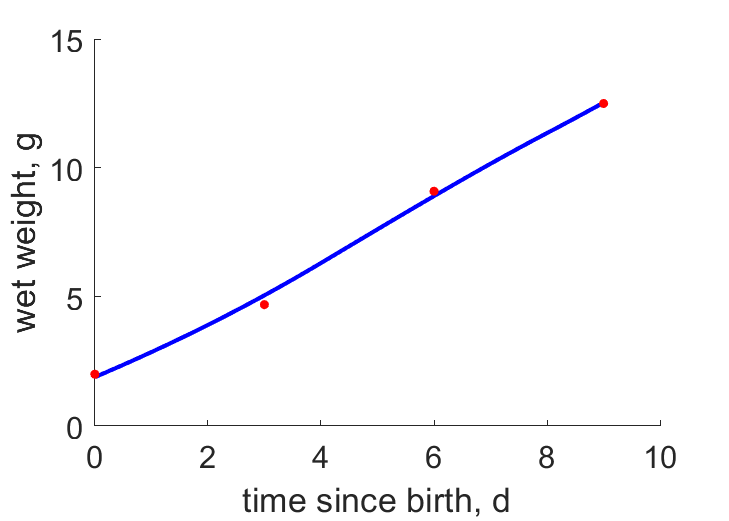Predictions & Data for this entry
| Model: std | climate: Cfa, Cfb | migrate: | phylum: |
| COMPLETE = 2.7 | ecozone: TA | food: biCi | class: |
| MRE = 0.033 | habitat: 0iTf, 0iTh | gender: Dg | order: |
| SMSE = 0.005 | embryo: Tnpf | reprod: O | family: |
Zero-variate data
| Data | Observed | Predicted | (RE) | Unit | Description | Reference |
|---|---|---|---|---|---|---|
| ab | 18.5 | 18.68 | (0.009548) | d | age at birth | Wiki |
| tx | 17 | 17.01 | (0.0003242) | d | time since birth at fledging | Wiki |
| tp | 51 | 50.79 | (0.004094) | d | time since birth at puberty | guess |
| tR | 365 | 365 | ( 0) | d | time since birth at 1st brood | guess |
| am | 1789 | 1787 | (0.0006562) | d | life span | Gill1982 |
| Ww0 | 2.3 | 2.909 | (0.2649) | g | initial wet weight | avibase |
| Wwb | 2 | 1.889 | (0.05573) | g | wet weight at birth | Gard2002 |
| Wwi | 12.9 | 13.03 | (0.0101) | g | ultimate wet weight for females | avibase |
| Wwim | 13.7 | 13.68 | (0.001606) | g | ultimate wet weight for males | avibase |
| Ri | 0.01644 | 0.0164 | (0.002124) | #/d | maximum reprod rate | Wiki |
Uni- and bivariate data
| Data | Figure | Independent variable | Dependent variable | (RE) | Reference |
|---|---|---|---|---|---|
| tW |  | time since birth | wet weight | (0.02459) | Gard2002 |
Pseudo-data at Tref = 20°C
| Data | Generalised animal | Pyrrholaemus sagittatus | Unit | Description |
|---|---|---|---|---|
| v | 0.02 | 0.02807 | cm/d | energy conductance |
| p_M | 18 | 446.7 | J/d.cm^3 | vol-spec som maint |
| k_J | 0.002 | 0.01833 | 1/d | maturity maint rate coefficient |
| k | 0.3 | 0.2998 | - | maintenance ratio |
| kap | 0.8 | 0.8547 | - | allocation fraction to soma |
| kap_G | 0.8 | 0.8018 | - | growth efficiency |
| kap_R | 0.95 | 0.95 | - | reproduction efficiency |
Discussion
- Body temperature is guessed
- Males are supposed to differ from females by {p_Am} only
- mod_1: Pseudo-data point k is used, rather than k_J; Data set tp and parameter t_R are added, the latter replacing clutch interval t_N. Postnatal T is based on PrinPres1991, see get_T_Aves. See further the revision page, theme puberty
Facts
- The nests are parasitised by the fan-tailed cuckoo (Cacomantis flabelliformis) and the black-eared cuckoo (Chrysococcyx osculans) (Ref: Wiki)
Bibliography